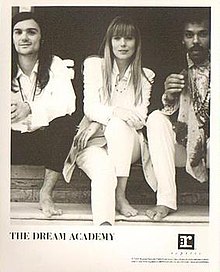Dream Academy
| The Dream Academy | |
|---|---|

|
|
| Background information | |
| Origin | London, England, United Kingdom |
| Genres | |
| Years active |
|
| Labels | |
| Associated acts | David Gilmour |
| Past members | |
The Dream Academy were an English band consisting of singer/guitarist Nick Laird-Clowes, multi-instrumentalist (chiefly oboe, Cor Anglais player) Kate St John, and keyboardist Gilbert Gabriel. The band is most noted for their 1985 hit single "Life in a Northern Town."
Laird-Clowes and Gabriel met each other in the late 1970s whilst the former was in a band called The Act. Their idea was to create a songscape different from the power pop groups popular at the time in the UK, by mixing instruments and sounds that had been rarely done prominently before, such as strings, woodwinds, percussion (timpani), and synthesizers. At first, Laird-Clowes and Gabriel called themselves the Politics of Paradise.
Laird-Clowes met Kate St John (then of The Ravishing Beauties) at a party, and asked her to join. The trio settled on the name The Dream Academy and shopped their demos for nearly two years. Their work was rejected by every record label before finally landing a recording contract with Warner Bros. Records in 1985. Along the way, they made some close connections with Adam Peters and Pink Floyd's David Gilmour, a friend of Laird-Clowes. Gilmour would go on to produce and/or play on two of their albums and co-write one Dream Academy song, "Twelve-Eight Angel".
Their first single, "Life in a Northern Town" was a worldwide success and sizeable hit in the U.S., charting at No. 7 on the Billboard Hot 100 chart, from an album co-produced by Gilmour. The song also made number 15 in the UK Singles Chart. The single was dedicated to the English singer-songwriter Nick Drake. It was their only major chart success. Reportedly, their record label initially did not want to release this single. They thought it needed more drums but Laird-Clowes and Gabriel were staunch in their opinion that it was perfect. They commented on its unique sound, and feeling of a winter snowstorm created almost unintentionally by the amount of overdubbing onto the original recording. The song also was initially called "Morning Lasted All Day" but was changed when Paul Simon commented to Laird-Clowes (to whom he was giving songwriting lessons) that it was not a good title.
...
Wikipedia
